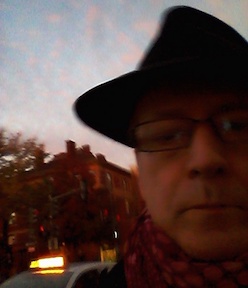It's been obvious since her first book that Tana French's true milieu, as a writer, is adolescence: all her books include a substantial element of childhood or youth, and sometimes even the adults talk and act like teenagers. But in The Secret Place, adolescence per se is her subject, specifically the tiny worlds of tight adolescent friendships. There is an odd supernatural/telekinetic element to the story (though it's not a Irish ghost story), which is resolved near the end in a way that illuminates French's view of these relationships in particular.
The story revolves around a private girls' school in Dublin. There are two "tracks," a current investigation that takes place all in one day and a back story, looking at the girls through the lens of two cliques, rivalries of a sort. What we don't get much of is the "school" part of their experience: most of what the girls are shown doing is worrying about their friends, contemplating the opposite sex, and dodging responsibility for their minor crimes, as well as the big one: the murder that occurs at the end of the backstory, a year before the current investigation.
What sparks the investigation is the reunion of two characters from a previous French novel (she tends to daisy chain her novels, shifting the focus in a new book to minor characters from a previous book). Holly Mackey is one of the girls in the school. She has discovered a note posted on a "secrets" board at the school (a physical board rather than a website), with text stating that the person posting the note knows who killed a boy a year ago on the school grounds. She brings it to a cold-case detective she had encountered in that earlier book, Stephen Moran (who is the narrator of the current-day portion of the book). Moran would love to shift over to the murder squad, and he takes the note to Antoinette Conway, the officer in charge of the original investigation, hoping to get in on a reopened murder case.
Moran gets his wish (Conway's a pariah in the department, currently without a partner), and though the rest of his part of the story is a long day of chasing down leads within the walls of the school, in both sections of the story we get a very great deal of teen angst, conversation, and attitude. The teen interactions (with each other and with the detectives) mostly ring true, and are sometimes painfully funny (painful comedy having been an element in the previous book in which Holly and Stephen featured, Faithful Place, whose main character was Holly's father Frank). But the sheer amount of teen-dom is a bit daunting (possibly only to an outsider like myself). And, as I mentioned before, the adults can begin to sound childish themselves, wrapped in their own envies and jealousies.
Finally, the payoff at the end (not so much the discovery of the killer and the motive as the resolution of the metaphorical elements of the story) is good enough to make the book rewarding, even if you, like me, don't relish spending quite so much time in YA-land. French has staked out a particular territory, and continues to mine it succesfully--and this time the metaphorical level of the story is particularly effective in a melancholy manner.



No comments:
Post a Comment